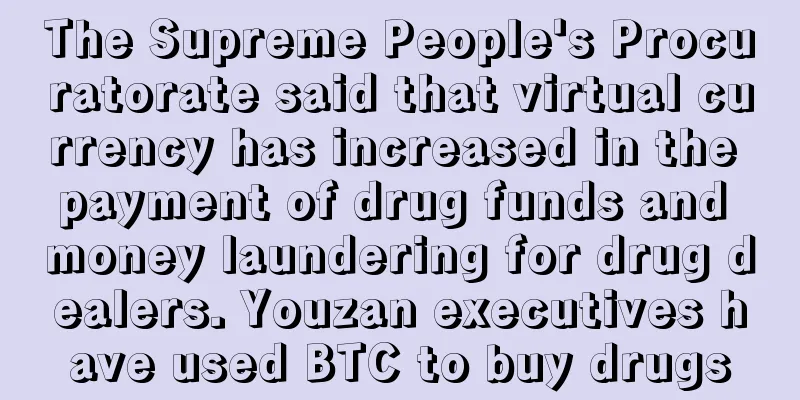The Supreme People's Procuratorate said that virtual currency has increased in the payment of drug funds and money laundering for drug dealers. Youzan executives have used BTC to buy drugs

|
Wu said blockchain learned that in the press conference of the Supreme People's Procuratorate on the 26th, the Supreme People's Procuratorate pointed out that the number of cases involving online drug crimes handled by the procuratorate has increased rapidly, and the use of third-party tools and virtual currency to pay for drug money has increased the difficulty of investigation and evidence collection. In addition, more and more drug criminals are laundering money through online gambling and virtual currency. The Supreme People's Procuratorate said that it will increase the intensity of the crackdown, always maintain a high-pressure situation, and strengthen communication and cooperation with the public security organs. Previously, Youzan's technical director Jiang began to log in to overseas websites selling methamphetamine (ice) (commonly known as the "dark web"), placed orders to buy methamphetamine, and used Alipay to buy Bitcoin to pay for the drugs. The methamphetamine was mailed from abroad to the office address of a company in Hangzhou where he worked. After receiving the methamphetamine, Jiang used it all for his own consumption and was sentenced to three years in prison, suspended for three years. Since the beginning of this year, due to criminals using cryptocurrency to launder money in telecommunications fraud, police investigations have resulted in a large number of bank cards being frozen. As the authorities pay attention to the use of cryptocurrency in gambling, drug-related and other fields, more severe crackdown measures can be taken. In terms of gambling, since the deployment of a special meeting on combating cross-border gambling on February 28, the Ministry of Public Security has deployed public security agencies across the country to seize more than 220,000 bank cards involved in the case and freeze more than 28,100 accounts involved in the case. The following is the full text of the Supreme People's Procuratorate: On June 26, Yuan Ming, director of the Second Procuratorate (Major Crime Procuratorate) of the Supreme People's Procuratorate, answered reporters' questions on punishing and preventing drug crimes in accordance with the law. Reporter: What are the current characteristics of Internet-related drug crimes and how do procuratorates respond? Yuan Ming: In recent years, the number of drug-related crime cases handled by the procuratorate has increased rapidly, and most of the drug-related crimes prosecuted are related to the Internet. The main forms of drug-related crime cases involving the Internet are: criminals use the Internet to publish drug-related information, order and sell drugs and drug-making materials; use the Internet to find, deceive and recruit "henchmen" to traffic drugs; use the Internet to teach drug-making techniques; use the Internet, instant messaging tools, and mobile payment methods to communicate and trade drugs; use cyberspace to gather drug users, exchange experiences, and induce others to take drugs, etc. The main characteristics of drug crimes involving the Internet are as follows: First, it is highly concealed, and it is difficult to obtain evidence for such crimes, and there are many difficulties in applying the law. Criminals often use online names or aliases to conceal their real identities, use jargon and jargon to communicate, and delete chat records and information at any time and instantly. Using third-party tools and virtual currency to pay for drugs, using virtual IP addresses to hide the crime site, and realizing contactless transactions of "separation of people and goods, separation of money and goods", it increases the difficulty of investigation and evidence collection. Second, the cost of crime is low and it is highly cross-temporal and cross-spatial. Using the Internet to sell drugs has a low cost of crime. The Internet spreads information quickly and covers a wide range, allowing drug crimes to break through geographical and time restrictions and become more common across regions and borders. Third, the crime has formed a full industrial chain of production, trafficking and transportation, which is very harmful. Drug information is widely spread on the Internet, which can easily mislead and induce young people to take drugs and commit crimes, further exacerbating the harm of drug crimes. In response to cases involving online drug crimes, we will focus on the following work: First, we will intensify the crackdown. We will always maintain a high-pressure situation, strengthen communication and cooperation with public security organs, guide the comprehensive collection of evidence related to Internet drug crimes in accordance with the law, improve the chain of evidence, and form a joint force to crack down. We will work with relevant departments to study and formulate guidelines for evidence review and legal application. Second, actively participate in the comprehensive governance of Internet drug control. In April this year, the Supreme People's Procuratorate established a research and guidance group for punishing cybercrimes and maintaining network security. In the next step, the procuratorate will strengthen the research on Internet drug crimes, strengthen exchanges and cooperation with key Internet companies, and enhance the ability and effectiveness of the procuratorate in participating in Internet drug control. For the social management loopholes exposed by Internet drug crime cases, timely formulate and issue procuratorial suggestions to promote the improvement of network supervision capabilities. Third, strengthen international judicial cooperation. The Internet has made cross-border drug crimes more common, and strengthening international judicial cooperation is particularly important. The Supreme People's Procuratorate will strengthen work in evidence conversion and review and identification, transfer of funds and property involved in the case, and delivery of judicial documents in accordance with the provisions of the International Criminal Judicial Assistance Law and other laws. Reporter: Could you please tell us about the procuratorial organs' punishment of drug-related money laundering crimes? Yuan Ming: Drug crimes are typical profit-seeking crimes. After obtaining huge profits, criminals often transfer and clean up the proceeds of crime through various money laundering methods. Therefore, it is particularly important to cut off the financial support of drug crimes and destroy their economic foundation. The Supreme People's Procuratorate attaches great importance to the prosecution of drug-related money laundering crimes. In April this year, it established an anti-money laundering leading group, and drug-related anti-money laundering is one of its important work contents. We guide local governments to increase the crackdown on drug-related money laundering crimes by publishing typical cases and organizing training. In 2019, the procuratorate handled more than 50 drug-related money laundering crimes, and filed 5 applications for confiscation of illegal proceeds of more than 3 million yuan in cases where drug criminals fled or died. In general, this type of crime is relatively small compared with the total number of drug crimes, which is closely related to factors such as the concealment of drug-related money laundering crimes and the difficulty of investigation and punishment. The main characteristics of drug-related money laundering crimes are: First, there are various ways of money laundering. Criminals use financial institutions or investments to launder drug funds, and some also use forged commercial bills, credit recovery, options, etc. to launder money. In recent years, more and more money laundering has been carried out through online gambling and virtual currency. Second, money laundering is becoming more and more concealed. Criminals transfer or conceal funds, so that the proceeds of drug crimes and the benefits obtained from normal business activities are integrated, making it difficult to identify the nature and amount of drug-related assets. Third, the criminal organization is tight. Drug-related money laundering activities have gradually evolved from scattered activities of concealing and hiding criminal proceeds to an operating system with specialized division of labor and strict organization, some of whom have professional knowledge such as finance and law. Next, the procuratorate will strengthen the following aspects of work: First, we should strengthen the leadership of drug-related anti-money laundering prosecution work. Under the unified deployment of the Supreme People's Procuratorate's Anti-Money Laundering Leading Group, the national procuratorates should form a national chess game, carry out work in a down-to-earth manner, deepen the concept of handling cases with equal emphasis on combating money laundering crimes and drug crimes, and increase the intensity of investigation and punishment of drug-related money laundering crimes. Second, we will improve the ability and level of drug-related asset review and identification. For particularly major, difficult and complex cases, we will intervene in advance, guide the verification of drug-related assets, and do a solid job in evidence collection and preservation. We will adhere to the principle of combining comprehensive review with key review, focus on reviewing the source, use and ownership of drug-related assets, and their relevance to drug crimes, accurately identify money laundering crimes, and improve the effectiveness of combating drug-related money laundering crimes. Third, strengthen cooperation and coordination with the public security, courts, and anti-money laundering departments to form a joint force. Improve the working mechanisms such as case reporting, joint meetings, and joint training, jointly study and establish an anti-money laundering fund monitoring model, strengthen the analysis of fund flows, and urge relevant departments to strengthen supervision of financial institutions and specific non-financial institutions. Unify law enforcement standards on issues such as the subjective knowledge of money laundering crimes and reach a consensus. Reporter: It is understood that the situation of drug delivery through express logistics has been prominent in recent years. Please introduce the situation in this regard and how the procuratorate responds? Yuan Ming: With the rapid development of my country's logistics and express delivery industry, the number of criminals using logistics and express delivery to traffic drugs has gradually increased in recent years. In 2019, the procuratorate handled more than 1,000 criminal cases involving the use of express delivery to deliver drugs. Especially after the outbreak of the COVID-19 epidemic, such criminal cases have increased significantly. The main characteristics of such cases are: First, a wide range of companies are involved. The delivery industry is widespread, and some cases use smart express lockers, city errands and other methods to commit drug crimes. Without face-to-face handovers or security inspection equipment, drugs are transferred quickly. Second, there are many cross-border and cross-provincial delivery cases. Some cases have been circulated through multiple provinces many times, and even drugs have been delivered across borders. Third, the crime is concealed, and drug-related clues are difficult to find. When drug-related persons deliver drugs, they will deliberately hide the drugs in other items, and immediately change to another way to hide them after being discovered. Others confuse investigations by delivering them tentatively first and then delivering them in multiple times. The delivery of drugs makes it easier for drugs to spread and circulate, especially when combined with the Internet, making it difficult to solve cases. In response to the increasing number of drug-related crimes using express delivery, the Supreme People's Procuratorate made unified arrangements at the end of 2019, requiring all localities to strengthen the investigation of drug-related crimes by express delivery, and to promote comprehensive governance of the problem through measures such as issuing procuratorial recommendations, compiling typical cases, and explaining the law and reasoning of cases. In the next step, the procuratorial organs will focus on the following work: First, issue procuratorial recommendations to promote the implementation of shared management responsibilities. In response to the regulatory loopholes reflected in the cases, effective supervision is promoted through procuratorial recommendations and other means, and concerted efforts are made to jointly manage and promote the implementation of the three systems of "receiving and sending inspection, receiving and sending under real names, and security inspection through machines" and the management of smart express cabinets to prevent the circulation of drugs in the delivery channels from the source. Provincial procuratorial organs such as Jiangsu, Sichuan, and Inner Mongolia have issued procuratorial recommendations to provincial postal management departments, urging them to increase supervision of the delivery industry. The Zhejiang Provincial Procuratorate, the Provincial Public Security Department, and the Provincial Postal Administration jointly issued a document to form a collaborative mechanism such as coordinated crackdown, information sharing, and special inspections, and actively explore pilot facial recognition real-name mailing, and security inspection of mail sent to key drug areas. Second, we will work with relevant departments to intensify punishment. We will work with the public security, postal and other departments to jointly carry out key rectification activities for drug crimes in the delivery industry to ensure the overall advancement of crackdown, management and prevention. For major, difficult and complex cases, we will intervene in advance, guide the investigation, clarify the direction and scope of evidence collection, and put forward opinions on improving evidence to ensure the traceability of the investigation. The third is to strengthen anti-drug publicity. Through case-based explanations, micro-films, short videos, test questionnaires and other methods, we will carry out anti-drug legal publicity and education and training to improve the anti-drug awareness, legal awareness and drug identification ability of employees in the express delivery industry, encourage employees and the public in the express delivery industry to discover and report drug and other criminal activities, and create a national anti-drug atmosphere. |
Recommend
What is the secondary lifeline and what is its impact?
We are very familiar with the lifeline. There wil...
What is the fortune of having a birthmark on the leg? Is it good to have a birthmark on the leg?
Birthmarks are also called by other names, such a...
Mole in the ear
Physiognomy is a type of physiognomy and also a v...
Men with impatient temperament
There are some people in life who are extremely i...
Binance’s counterattack against the SEC’s allegations, is it tenable?
After news broke that the U.S. Securities and Exc...
Analysis of the face of a man with a bulbous nose who has good fortune
What is the fate of a man with a bulbous nose? Th...
Is it good to have a mole on your calf? What's the saying?
Traditional physiognomy covers a wide range, among...
IPFS: A Review of 2019
Let’s review 2019 together! From progress made ac...
Detailed introduction to the real Yin De Wen facial features
The real Yin De lines actually refer to the brigh...
What kind of people are prone to failure due to financial troubles?
Everyone wants money, but we should get it in a p...
What does it mean when a man or woman has dimples?
Some people are born with dimples and some are no...
What does a man's left hand with a broken palm mean?
There are many special cases in the palm, such as...
What does a forked lifeline mean?
The texture of the lifeline on everyone’s palm is...
AICPA wants IRS to develop Bitcoin tax guidelines
Rage Comment : US tax experts have begun to worry...
What is the personality of a man with three white eyes? What does a man with three white eyes mean?
Men with white eyes have bad careers In fact, car...









